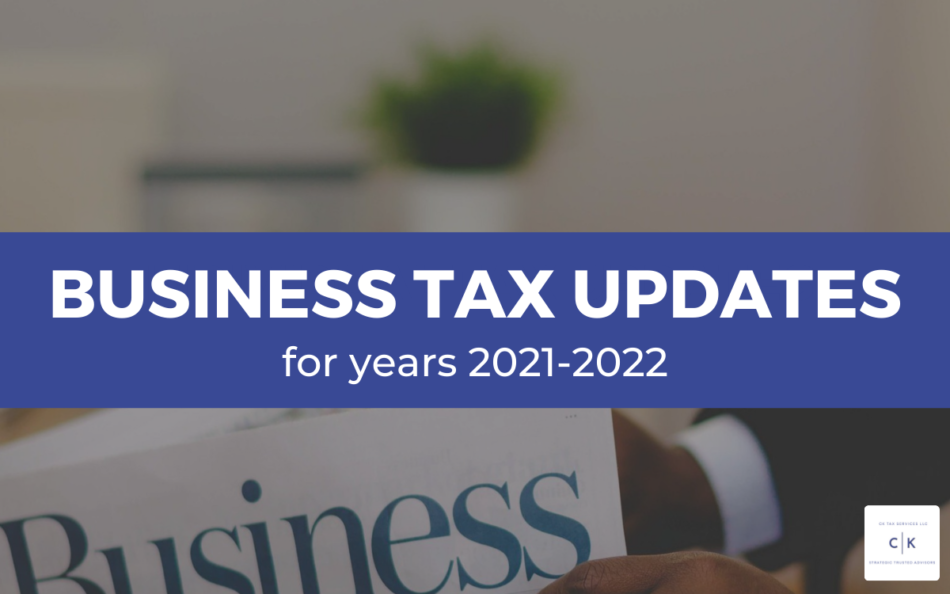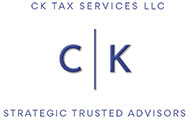Business Tax Updates for Years 2021-2022

This is the second of a 4-part blog series on 2021 & 2022 Tax Changes.
(You may read part 1 out of 4 here.)
written by Gina Lee, Senior Associate at CK Tax Services LLC
On this week’s blog, we will talk about some significant business tax changes for 2021.
A sole proprietorship or an LLC disregarded for tax purposes reports its business income and expenses on Schedule C (or Schedule E for rental properties) of the taxpayer’s individual tax return (Form 1040). The deadline to file the federal individual tax return is April 18, 2022.
For a C corporation (whether a corporation under state law or an LLC electing to be taxed as a C corporation), the deadline to file Form 1120 is also April 18, 2022. For either Form 1040 or Form 1120, the taxpayer can file an extension to file the 2021 tax returns and the extended deadline is October 17, 2022.
For an S corporation or a partnership, the deadline to file Form 1120S and Form 1065 (collectively, the “Pass-Through Forms”) is March 15, 2022. If the company files an extension to file the Pass-Through Forms, the deadline to file the Pass-Through Forms is September 15, 2022.
For a trust or an estate, the deadline to file Form 1041 is April 18, 2022. If trust or estate files an extension to file Form 1041, the deadline to file Form 1041 is September 30, 2022.
If you have a business, here are some key items to keep in mind for tax years 2021 and 2022:
Here are some key items to keep in mind for tax years 2021 and 2022:
• Bonus Depreciation for Businesses
As part of the Tax Cuts and Jobs Act (TCJA), businesses are allowed to take a 100% bonus depreciation deduction on qualified property acquired and placed in service after September 27, 2017, and by December 31, 2022. Often referred to as the “first-year” bonus depreciation deduction, the deduction rate used to be 50% for qualified business property acquired and placed in service before the tax year 2018. Starting with the tax year 2018, 100% cost of business assets purchased and used during a given tax year is currently deductible, instead of depreciating or amortizing the cost over a number of years. The 100% bonus depreciation deduction is expiring at the end of this year, and the rate will go back to the old rate of 50% starting with the tax year 2023 unless Congress amends the law in the future.
• Business Meals Deduction
Typically, businesses are only allowed to deduct 50% of expenses on business meals. For tax years 2021 and 2022, businesses are allowed a 100% deduction on business meals expenses. Fiscal year businesses must prorate and deduct business meal expenses incurred from 1/1/2021 through 12/31/2022.
For the avoidance of doubt, entertainment expenses are not deductible.
• Paycheck Protection Program (PPP) Loan Forgiveness
The Consolidated Appropriations Act (CAA) of 2021 provided that PPP loan forgiveness is nontaxable income and that businesses are additionally allowed tax deductions for qualified expenses used by the forgiven PPP funds.
However, taxpayers must check the state tax implications. Some states treat the amount of PPP loan forgiveness as taxable income and the amount of PPP loan forgiven will be taxable income on the state tax return.
• IRS Extended Deadline to Accept Digital Signature for Certain Forms Due to Covid-19
To help reduce the burden on the tax community, the IRS allows taxpayers to use electronic or digital signatures on certain paper forms they cannot file electronically. This policy has been extended through October 31, 2023. Some of the forms included in this policy are as follows:
- Form 706, U.S. Estate Tax Return;
- Form 709, U.S. Gift Tax Return;
- Form 3520, Annual Return to Report Transactions with Foreign Trusts and Receipt of Certain Foreign Gifts;
- Form 3520-A, Annual Information Return of Foreign Trust with a U.S. Owner;
- Form 8832, Entity Classification Election; and
- Section 83(b) Election Statements.
Gina Jeyoung Lee is a senior associate at CK Tax. Gina is involved in individual and business tax planning and compliance, as well as domestic and international estate planning. Gina’s experience includes preparing and reviewing individual and business tax filings, preparing tax planning memoranda, and drafting estate planning documents.
« Tax Changes You Should be Aware of for Tax Years 2021 & 2022 Tax Update: IRS to Stop Certain Automated Notices »